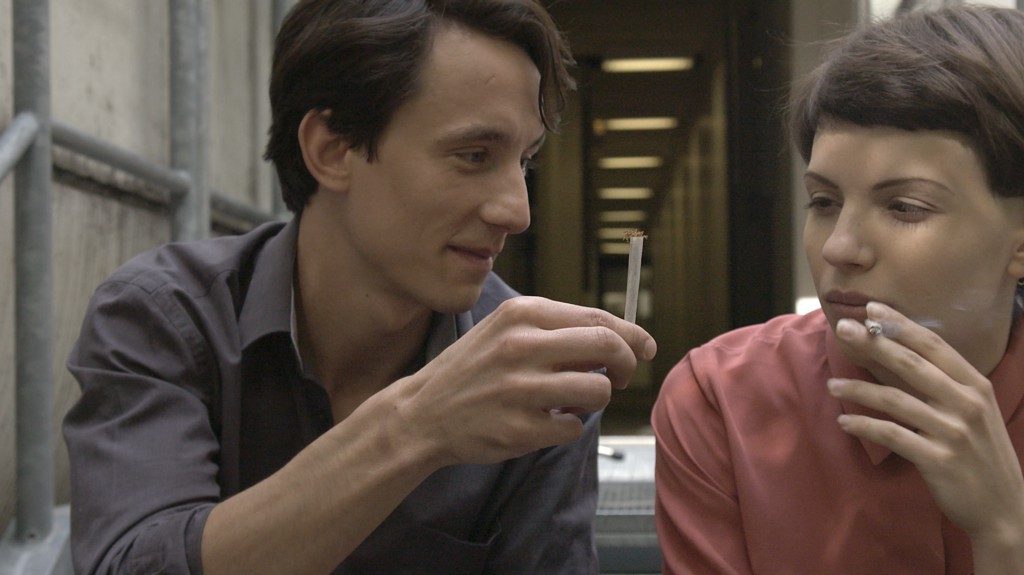Ruth Beckermann was born in Vienna. She studied journalism and art history in Vienna, Tel Aviv, and New York. She has contributed as a journalist to several Austrian and Swiss magazines. In 1978 she co-founded the distribution company filmladen in which she was active for seven years. In this period Beckermann started to make films and to write books.
“The Dreamed Ones” will premiere at the 2016 BFI London Film Festival on October 6.
W&H: Describe the film for us in your own words.
RB: It is a film about love and hate. At center stage are the two poets Ingeborg Bachmann and Paul Celan, who came to know each other in post-war Vienna. Their dramatic postal exchange creates the textual basis of the film. Two young actors meet in a recording studio to read the letters.
The tumultuous emotions of proximity and distance, and fascination and fear, captivate them. However, they also enjoy each otherʼs company, arguing, smoking, discussing their tattoos and favorite music. Yesterday’s love, today’s love, and tomorrow’s: the heart of the film lies in where these lines are blurred.
W&H: What drew you to this story?
RB: For me the relationship between Bachmann and Celan is a paradigmatic modern love story — modern in the sense that both of them are aware of the fact that one cannot really get close or know another person. One can try and Bachmann desperately does, but the Other stays a stranger.
The story takes place a couple of years after the Holocaust, but it still rings true as a modern love story. He was Jewish and she, the daughter of a Nazi. Of course this was an extreme set-up, but today there are so many enemy-collectives as well: think about Israelis and Palestinians, or Serbs and Croats. Despite all that, individuals cross borders to get to know the Other.
W&H: What do you want people to think about when they are leaving the theater?
RB: That it is a cliché to think that a love story would only be successful or fulfilling if there’s a so-called “happy ending” — the idea the two will stay together, build a house, have three kids and, and get a dog. Love has so many faces, and a complicated relationship or a brief encounter with someone is sometimes more inspiring than the daily routine.
W&H: What was the biggest challenge in making the film?
RB: This was my first movie using actors, so this presented a new challenge for me. It was especially difficult to find two very young actors who have the sensibility to understand and read these letters. After a long casting process, I finally found the actor Laurence Rupp and the musician Anja Plaschg of Soap&Skin, who writes her own lyrics and music.
It was very important to me that these two actors had chemistry due to the hybrid nature of the film, which is both scripted and unpredicted.
W&H: How did you get your film funded? Share some insights into how you got the film made.
RB: The film was funded by the Austrian Film Institute and ORF-Austrian TV. We still have a functioning public funding system which makes it possible to avoid complicated co-productions.
W&H: What does it mean for you to have your film play at LFF?
RB: The film premiered in Berlin in February and has been touring festivals since then. Every festival has a different audience, so being present for Q&A sessions remains interesting. It has been a while since the LFF has shown a film of mine, and I am happy to be back.
W&H: What’s the best and worst advice you’ve received?
RB: Best advice: Follow your gut only after you’ve consulted your brain
Worst advice: Attend a pitching session
W&H: What advice do you have for other female directors?
RB: Don’t stop! Not for a lover and not for a baby — just go on and do your next project.
W&H: Name your favorite woman-directed film and why.
RB: Chantal Akerman’s “News from Home.” I love all her films, but this one is an example of how much you can achieve with a very small budget.
W&H: Have you seen opportunities for women filmmakers increase over the last year due to the increased attention paid to the issue? If someone asked you what you thought needed to be done to get women more opportunities to direct, what would be your answer?
RB: Everyone has obstacles. Women might have more in the film industry, but I have been making films for a long time and opportunities arise if you fight for them. Be a fighter!







